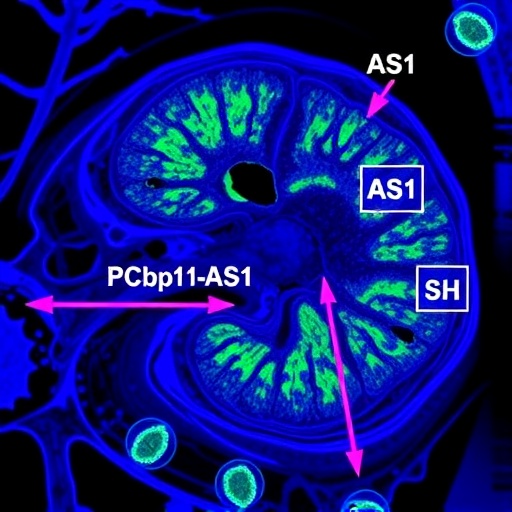In a groundbreaking study poised to reshape our understanding of pancreatic cancer metastasis, researchers have unveiled the pivotal role of PCBP1-AS1, a long non-coding RNA, in facilitating liver metastasis by modulating miR-125b-5p within tumor-derived exosomes. This intricate molecular interplay targets TNFAIP3, a critical suppressor of oncogenic pathways, thereby influencing the tumor microenvironment and metastatic progression. Pancreatic cancer notoriously exhibits poor prognosis, largely due to its aggressive metastatic tendencies, particularly to the liver. The discovery unveils a nuanced mechanism where the tumor communicates with distant sites via exosomes, small extracellular vesicles carrying molecular cargo that profoundly affect recipient cells.
At the heart of this cellular crosstalk lies miR-125b-5p, a microRNA markedly upregulated in pancreatic cancer tissues and patient peripheral blood exosomes. This elevation correlates strongly with advanced tumor stages and, notably, liver metastases, underscoring its potential as both a biomarker and therapeutic target. The study delves deeply into the relationship between miR-125b-5p and TNFAIP3, revealing that miR-125b-5p directly suppresses TNFAIP3 expression. TNFAIP3 functions as a negative regulator of the NF-κB pathway, a master orchestrator of inflammation and cancer progression. In this context, miR-125b-5p indirectly fuels NF-κB activation, thus amplifying tumor-promoting signals.
The researchers employed a comprehensive suite of molecular biology techniques, including dual-luciferase reporter assays, to validate the targeting dynamics among PCBP1-AS1, miR-125b-5p, and TNFAIP3. These assays confirmed that PCBP1-AS1 acts as a molecular sponge, sequestering miR-125b-5p away from TNFAIP3 mRNA, thereby alleviating its repression. This competing endogenous RNA mechanism highlights the sophisticated layers of gene regulation beyond protein-coding sequences, illustrating the complexity of RNA-based regulation in cancer biology.
To dissect the functional implications of these molecular interactions, pancreatic cancer cell lines were genetically engineered to overexpress or suppress PCBP1-AS1, miR-125b-5p, and TNFAIP3 individually and in combination. Through these manipulations, the team demonstrated that restoring PCBP1-AS1 expression attenuates miR-125b-5p-mediated downregulation of TNFAIP3, thereby suppressing NF-κB activation. This restoration mitigated the aggressive phenotypes characteristic of pancreatic cancer cells, including enhanced proliferation, invasion, and metastatic potential.
Remarkably, the influence of tumor-derived exosomes extended beyond cancer cells to reshape the tumor microenvironment. Exosomes enriched with miR-125b-5p promoted the transformation of hepatic stellate cells (HSCs) into cancer-associated fibroblasts (CAFs), key players in establishing a pro-tumorigenic niche within the liver. This stromal remodeling facilitates metastatic colonization and growth, indicating that exosome-mediated communication is critical for the formation of liver metastases in pancreatic cancer.
In vivo experiments using a mouse model of pancreatic cancer liver metastasis provided compelling evidence that preconditioning with exosomes harboring high levels of miR-125b-5p accelerated liver metastasis. Correspondingly, this was associated with decreased TNFAIP3 expression and enhanced NF-κB signaling in metastatic niches. Conversely, inhibition of miR-125b-5p curtailed these effects, underscoring its central role in orchestrating the metastatic cascade.
The study also revealed a stark inverse relationship between PCBP1-AS1 expression and patient survival. Lower levels of PCBP1-AS1 were not only prevalent in pancreatic cancer tissues compared to normal counterparts but were significantly diminished in tumors from patients with liver metastases. This correlation positions PCBP1-AS1 as a potential prognostic biomarker, with therapeutic implications in reversing or preventing metastatic progression.
By illuminating the molecular axis of PCBP1-AS1, miR-125b-5p, and TNFAIP3 within tumor-derived exosomes, this research opens new avenues for targeted therapies aimed at disrupting the communication networks that cancer cells exploit for metastasis. Targeting miR-125b-5p or augmenting PCBP1-AS1 expression could restore the tumor-suppressive functions of TNFAIP3, dampen NF-κB activation, and inhibit the harmful remodeling of the liver microenvironment.
This pioneering work underscores the growing appreciation for non-coding RNAs and extracellular vesicles in cancer biology, challenging the traditional paradigms that have focused almost exclusively on protein-coding genes. The sophisticated gene regulation and intercellular dialogues uncovered here highlight the importance of a systems biology approach in understanding and ultimately combating pancreatic cancer metastasis.
Moreover, the findings emphasize the crucial role of the tumor microenvironment—specifically the transformation of HSCs into CAFs—in facilitating metastatic colonization. This cellular metamorphosis, driven by exosomal miR-125b-5p, exemplifies how cancer hijacks normal stromal cells to support its growth and dissemination, suggesting novel stromal-targeted therapies.
In the broader context of oncology, this study exemplifies the intricate interplay between tumor cells and their systemic milieu mediated through exosomes, which serve as vehicles of molecular influence hiding in plain sight within the circulatory system. Such insights not only refine our understanding of metastatic disease but may also inspire innovative liquid biopsy techniques based on exosomal cargo profiles.
Looking forward, translating these molecular discoveries into clinical interventions will necessitate the development of delivery systems capable of modulating non-coding RNAs like PCBP1-AS1 and miR-125b-5p in vivo. Nanotechnology and vector engineering may hold the key to bringing these promising therapeutic strategies from bench to bedside.
This research heralds a new chapter in pancreatic cancer biology, where targeting the non-coding RNA interplay within exosomes redefines the fight against one of the deadliest malignancies. As the field embraces the complexity of tumor-host communications, the pursuit of breakthrough treatments for metastatic pancreatic cancer grows ever more tangible.
In sum, the elucidation of PCBP1-AS1’s role in modulating miR-125b-5p to regulate TNFAIP3 and downstream NF-κB signaling unveils a vital mechanism underpinning liver metastasis in pancreatic cancer. This discovery not only advances our molecular understanding but also charts a path forward toward innovative diagnostics and therapeutics aimed at stemming the tide of metastatic disease.
Subject of Research: Pancreatic cancer metastasis mechanisms involving non-coding RNAs and tumor-derived exosomes.
Article Title: PCBP1-AS1 facilitates liver metastasis in pancreatic cancer by modulating miR-125b-5p in Tumor-derived exosomes to target TNFAIP3.
Article References: Wang, Q., Zhang, J., Wang, H. et al. PCBP1-AS1 facilitates liver metastasis in pancreatic cancer by modulating miR-125b-5p in Tumor-derived exosomes to target TNFAIP3. BMC Cancer 25, 1553 (2025). https://doi.org/10.1186/s12885-025-14854-x
Image Credits: Scienmag.com
DOI: https://doi.org/10.1186/s12885-025-14854-x
Tags: cancer biomarkersLong non-coding RNAmetastatic progressionmiR-125b-5pNF-kB pathwayoncogenic pathwayspancreatic cancer liver metastasisPCBP1-AS1therapeutic targetsTNFAIP3 regulationtumor microenvironmenttumor-derived exosomes





